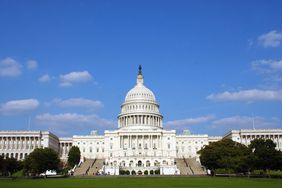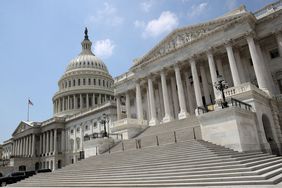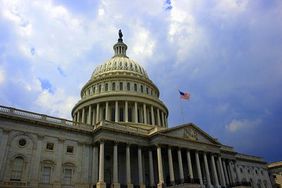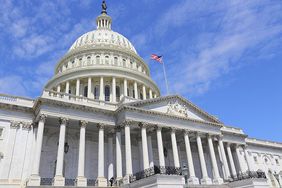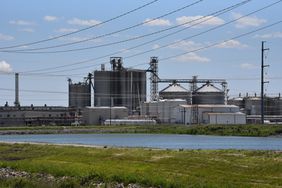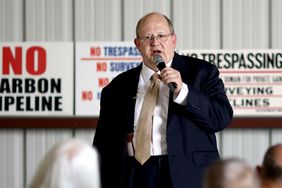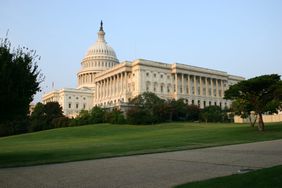:max_bytes(150000):strip_icc()/GettyImages-497322993-56b680be3df78c0b135a429c.jpg)
By Jacob Fischler
A lopsided vote on the U.S. Senate Energy and Natural Resources Committee advanced a bipartisan bill Wednesday to overhaul the process to gain federal approvals for energy projects.
The 15-4 vote demonstrated broad support for the bill, though it remains unclear if Congress will take the time in an election year to move the measure to President Joe Biden’s desk.
Members of both parties have complained that the process of gaining permits from federal agencies for energy projects is overly complicated and lengthy, delaying clean energy and fossil fuel production alike. The bill, sponsored by West Virginia independent Joe Manchin III and Wyoming Republican John Barrasso, aims to streamline the federal permitting process.
The bill would also require lease sales for oil and gas production in the Gulf of Mexico and lift a controversial pause on certain liquefied natural gas exports that Biden put in place in January.
At Wednesday’s committee meeting, Manchin, who chairs the panel, said only a bipartisan effort could effectively cure the problems with energy permitting. The bill was the product of nearly two years of negotiation that included input from a wide range of interested parties, he said.
“We’ve listened to everyone,” Manchin said. “And I think we’ve hit it right in the middle.”
Democrats Ron Wyden of Oregon and Mazie Hirono of Hawaii, as well as independent Bernie Sanders of Vermont, who caucuses with Democrats, voted against the measure. Republican Sen. Josh Hawley of Missouri also voted no.
Sen. Martin Heinrich of New Mexico, who is in line to be the next top Democrat on the committee after Manchin — formerly a Democrat — retires in January, supported the bill, which could give the package momentum in the next Congress if it stalls this year.
Heinrich said that while certain provisions would increase carbon dioxide emissions, the bill’s benefits outweigh the harms.
“This was a carefully crafted, bipartisan, balanced bill,” he said after the vote. “All of us have things we love about it. We also have a few things that we’re not crazy about, but that’s how legislation works.”
Republican Sen. Lisa Murkowski of Alaska sounded similar notes, saying the bill lacked some elements she wanted, but was overall a positive step.
“I think it’s important that we demonstrate some forward movement on permitting reform,” she said. “And while this isn’t the end-all and be-all, as we’ve all acknowledged, it starts moving us forward.”
Environmental opposition
While most Democrats on the committee supported the bill, some opposed the measure based on provisions that would benefit the fossil fuel industry. Some environmental advocates also raised that objection.
“It’s disappointing so many senators have been duped into voting for another sweetheart deal for the fossil fuel industry in exchange for meager improvements on electricity transmission,” Brett Hartl, government affairs director at the environmental group Center for Biological Diversity, wrote in a statement.
Wyden said he supported several parts of the bill, but could not support the entire package. The bill would counteract the 2022 law Democrats passed that offered hundreds of millions of dollars in tax credits for clean energy, Wyden said.
Wyden praised provisions to overhaul mining standards, ease permitting for transmission lines and address geothermal energy. If the bill contained only those provisions, Wyden said he would support it and “recommend a parade down Main Street.
“Unfortunately, there are a number of provisions in this bill that run contrary to what I think the effort in 2022 was all about, the transformative efforts,” he said.
Amendments rejected
Wyden called for continued efforts to rework the bill before it receives a vote on the Senate floor. Other members, including those who voted to approve the bill, also called for continued tweaks.
Murkowski, a former chair of the committee, said she was disappointed the bill did not include more on hydroelectric energy.
Manchin told Murkowski he would continue to work with her on hydro provisions.
Members of both parties introduced a series of amendments Wednesday. Republicans largely sought additional requirements to produce fossil fuels. Democrats sought restrictions on fossil fuel production.
Manchin led opposition to all the amendments introduced Wednesday, saying they would throw off the bill’s careful bipartisan balance.
“I believe that we’ve identified a reasonable compromise with our bill,” he said.
Iowa Capital Dispatch is part of States Newsroom, a network of news bureaus supported by grants and a coalition of donors as a 501c(3) public charity. Iowa Capital Dispatch maintains editorial independence. Contact Editor Kathie Obradovich for questions: info@iowacapitaldispatch.com. Follow Iowa Capital Dispatch on Facebook and Twitter.
